A local poet's latest
Priscilla Long is a return sponsor. Her recently published book Crossing Over has found a very strong reception from the local poetry scene.
We have three poems from the book on our sponsor page for you to read. Our thanks to Priscilla for her sponsorship. Read through the work, and consider purchasing at a local store, like the one she recommends — Open Books.
Sponsors like Priscilla are what keep us running with the original content you see every day. We're so grateful she joined with us again to sponsor the site. Thanks to her for being part of our campaign to make internet advertising 100 percent less terrible.
Seattle University's Search for Meaning festival is an underrated event in Seattle's literary calendar. Past speakers at the festival, which began in 2009, include Michael Chabon, Sherman Alexie, Reza Aslan, and Anne LaMott. This year's Search for Meaning slate includes spiritual writer Tracy Kidder; Suki Kim, who went undercover in North Korea and lived to tell the tale; and journalist Sam Quiñones. Tickets for this year's festival are $10, and they're available right now. Besides those three authors, you'll also have access to a full day's worth of presentations, lectures, over 50 authors, signings, and a book fair.
The Doctor is in
Published December 21, 2015, at 10:05am
A.L. Kennedy writes gorgeous literary fiction. Now she's written a Doctor Who novelization. What's up with that?
The Sunday Post for December 20, 2015
Men Explain Lolita To Me
Rebecca Solnit, after writing a piece mocking Esquire's infamous "80 Books Every Man Should Read", got things explained to her by white men. Thankfully, she's wonderful at explaining things back. It was hard to find a quote from this essay to pull here, since there were many paragraphs I wanted to quote, but this one in particular I found very affecting:
There is a common attack on art that thinks it is a defense. It is the argument that art has no impact on our lives, that art is not dangerous, and therefore all art is beyond reproach, and we have no grounds to object to any of it, and any objection is censorship. No one has ever argued against this view more elegantly than the great, now-gone critic Arthur C. Danto, whose 1988 essay on the subject was formative for my own thinking. That was in the era when right-wing senators wanted to censor art or cancel the National Endowment for the Arts altogether. The argument against this art, which included Robert Mapplethorpe’s elegantly formalist pictures of men engaged in sadomasochistic play, was that it was dangerous, that it might change individual minds and lives and then our culture. Some of the defenders took the unfortunate position that art is not dangerous because, ultimately, it has no impact.
Photographs and essays and novels and the rest can change your life; they are dangerous. Art shapes the world. I know many people who found a book that determined what they would do with their life or saved their life. Books aren’t life preservers; there are more complex, less urgent reasons to read them, including pleasure, and pleasure matters. Danto describes the worldview of those who assert there is an apartheid system between art and life: “But the concept of art interposes between life and literature a very tough membrane, which insures the incapacity of the artist to inflict moral harm so long as it is recognized that what he is doing is art.” His point is that art can inflict moral harm and often does, just as other books do good. Danto references the totalitarian regimes whose officials recognized very clearly that art can change the world and repressed the stuff that might.
An unbelievable story of rape
ProPublica and The Marshall Project bring this long, detailed, important story about the success, and failures, of policing in rape cases.
The fear of false rape accusations has a long history in the legal system. In the 1600s, England’s chief justice, Matthew Hale, warned that rape “is an accusation easily to be made and hard to be proved, and harder to be defended by the party accused.” Judges in the U.S. read the so-called Hale warning to juries until the 1980s. But most recent research suggests that false reporting is relatively rare. FBI figures show that police annually declare around 5 percent of rape cases unfounded, or baseless. Social scientists examining police records in detail and using methodologically rigorous standards cite similar, single-digit rates.
One more day before the band stops playing
Through tomorrow you can read an excerpt from Eugene M. Babb's stories of the gigging life, Grit and Roses. Babb and Third Place Press are our sponsors this week, and we're absolutely thrilled to have them.
We really loved Babb's direct, lyrical prose, and think you will too. We have two pieces from the book on the sponsor page for you to read. Make sure to do so before Sunday!
We're so grateful to sponsors like this, local writer, local press. We couldn't do what we do without them. Show them some love, and let them know you're grateful to them joining us in our camapign to make internet advertising 100 percent less terrible.
Rahawa Haile’s short stories of the day, of the previous week, for December 19, 2015
Every day, friend of the SRoB Rahawa Haile tweets a short story. She gave us permission to collect them every week. She's archiving the entire project on Storify.
Since Rahawa is ending this project at the end of the year, this is the third-to-last posting of our wrap-up. Two more to go, and then we launch something new on Saturdays, starting January 10th.
Short Story of the Day #342
Leena Khron's "Lucilia Illustris" (1992)
https://t.co/Vj5G1k4vmt pic.twitter.com/lz3Oo9F6q4
— Rahawa Haile (@RahawaHaile) December 12, 2015Short Story of the Day #343
Lulu Miller's "Me and Jane"
Catapult (2015)
https://t.co/XqkTke6GbK pic.twitter.com/281azNzFJm
— Rahawa Haile (@RahawaHaile) December 12, 2015Short Story of the Day #344
On a red-eye back to New York City, my last for what I suspect will be a very long time.
— Rahawa Haile (@RahawaHaile) December 14, 2015Short Story of the Day #345
Chelsea Laine Wells's "We Are the Hallwalkers"
Hobart (2015)
https://t.co/pPJcrfwBRM pic.twitter.com/k0qqi4yE3Q
— Rahawa Haile (@RahawaHaile) December 16, 2015Short Story of the Day #346
Megan Louise Rowe's "Lampshades"
SmokeLong (2015)
https://t.co/8gVHTxETDW pic.twitter.com/Q7oMlFybJ5
— Rahawa Haile (@RahawaHaile) December 16, 2015Short Story of the Day #347
Aysegul Savas's "The Road to Alpullu"
Guernica (2015)
https://t.co/tKcMH1Qyhu pic.twitter.com/5MQJHbEuVY
— Rahawa Haile (@RahawaHaile) December 16, 2015Over on Medium, Mike Meginnis explains the problem with Narrative Magazine, beginning with their exorbitant $23 submission fee, continuing with the astonishing amount that their founders are paid, and culminating with a how-to-write book Narrative is selling on their site that will apparently cost $225. (That's not a typo.) Please go read the whole thing.
The sky is falling
Published December 18, 2015, at 11:45am
In the late 1950s, two men from Argentina published a comic about a horrific alien invasion that quickly became embraced as a classic in Latin American science fiction. It's finally just been published in English for the very first time. Lucky you.
The Help Desk: Sentimental, old, and smelly
Every Friday, Cienna Madrid offers solutions to life’s most vexing literary problems. Do you need a book recommendation to send your worst cousin on her birthday? Is it okay to read erotica on public transit? Cienna can help. Send your questions to advice@seattlereviewofbooks.com.
Dear Cienna,
My granddad died in the spring. He left me all of his books. The gesture meant a lot to me. He used to read to me when I was a baby, and I remember spending hours in his study when I was a kid, flipping through his books. So now they're my books. But there's a problem: they stink. My granddad was a heavy smoker and I'm not. His books reek of cigarette smoke. I've looked around online and the solutions for this are complicated and seem like they might not work. Am I a terrible person if I give these books away? Will anyone even take them? They really, really smell bad.
Jim, Renton
Dear Jim,
I empathize. When my grandmother, Berta, died on Christmas Eve a few years ago, my mother inherited the chair she died in and I inherited her death suit: a fuzzy blue robe and dog-hair enhanced red slippers. Everything smelled like ham and stale Easter candy. So loud was the candy-ham stench that cats and men in camouflage named Rufus started showing up asking vague questions, or mewing, with shifty eyes. I took up not bathing just to mask the odor.
Have you considered not bathing? It frees up a lot of time for reading!
Most babies have shit taste in books, so I hesitate to guess what your collection could entail. Still, I suggest going through and choosing one or two that have sentimental value. Carefully pack those books in a drawer with aromatic soaps (or a candy-ham combo), which will help the smoke smell dissipate after a time. Then, organize a party (New Year’s is a fine excuse) and sacrifice the rest of your grandfather’s collection to a roaring bonfire. I know book burnings are still gauche everywhere except church parking lots and the odd Trump rally, but still: donate books in such terrible shape and they’ll end up in the dump anyway. You might as well celebrate in style with friends, family, and a smokestack worthy of your grandfather’s memory.
Kisses,
Cienna
Portrait Gallery: Sarah Galvin
Each week, Christine Larsen creates a portrait of a new author for us. Have any favorites you’d love to see immortalized? Let us know
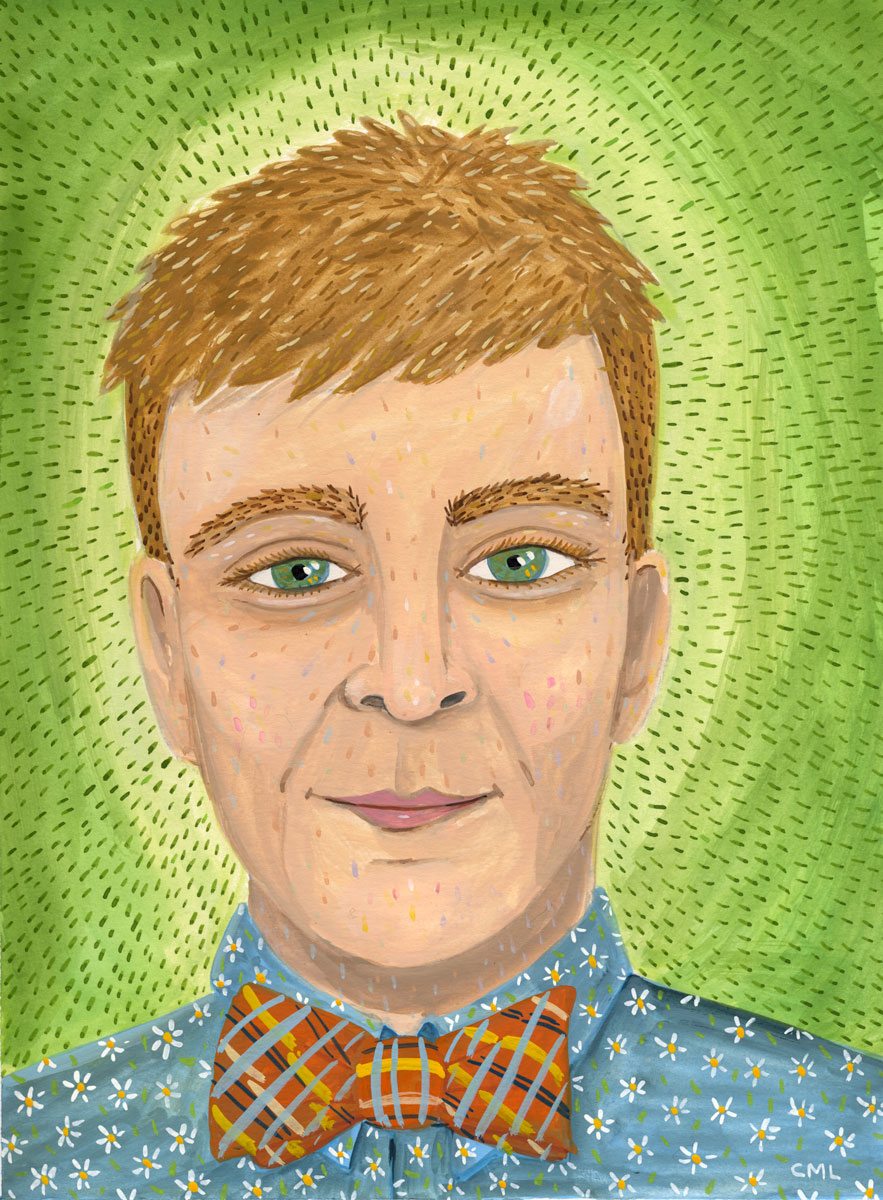
Sarah Galvin is appearing Sunday at Hugo House. Yesterday, we published a review by Paul Constant about her new book.
Shelf Awareness, which broke the news about Amazon Books, continues to raise questions about the brick-and-mortar outpost of Amazon.com:
Is Amazon Books getting its stock from Amazon.com, which gets extra terms unavailable to most bricks-and-mortar retailers? Are books being bought non-returnable by Amazon.com but being returned by Amazon Books to Amazon.com? How, if at all, is a distinction made between the two businesses--and how will that be handled at meetings in which the bookstore buyers participate?
This is an important distinction to make: publishers sell books to physical retailers under very different terms — discounts, returnability, etc. — than they do with online booksellers. Publishers would likely be very upset if they learned that Amazon Books is selling books that were sold to Amazon.com.
Thursday Comics Hangover: Norovirus vs. Mark Millar
Last week, I contracted norovirus. It was terrible, and I’m not going to tell you any more about it except to say that I wound up in bed for 36 hours, feeling awful. I couldn’t watch movies. I couldn’t read poetry or prose. All I could stand to read, all I could focus my attention on for more than a minute at a time, was comic books. This has pretty much always been true for me; whenever I come down with an illness bad enough to send me to bed, I wind up reading comics. I always have a little stash of unread comics lying around for that moment when I get sick and need to get out of my head.
I had bought a used collected edition of Mark Millar’s and Sean Murphy’s comic Chrononauts at University Book Store and added it to my sick stash about a month before the norovirus kicked in. I’m a fan of Murphy’s art — the man can draw anything, from a futuristic pirate civilization in The Wake to religious parody in Punk Rock Jesus — but my feelings for Mark Millar are decidedly more complex. In fact, I think I hate him.
The sad truth about Mark Millar is that almost all of his comics could be pitched as “What if __ were irresponsible?” His comic Kick-Ass is about what would happen if superheroes were a bunch of irresponsible pricks. Civil War and Old Man Logan are about what would happen if every character in the Marvel universe started to act like an asshole. The Ultimates is about the Avengers being egomaniacal monsters. Jupiter’s Circle is about the Superman family of characters acting like the Kardashians. And on and on and on. Not that there’s necessarily anything wrong with this, in theory: virtually any premise could make a good comic, if handled correctly. But Millar’s characters are all the exact same asshole, the kind of insufferable douche who gets drunk at a party and immediately starts bragging about how awesome his life is. If Millar’s parodying something, that parody gets lost in all the obnoxious braggadocio.
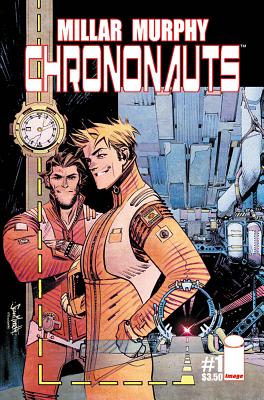
Here is the plot: the time travelers decide to rule the world. “Back home I’ve got nothing, dude” the inventor of the world’s first time-travel device tells his friend. “Here, I’m a king,” he says, and he gestures around his kingdom: there’s a large print of a woman wearing a bikini on the wall, and a few sports cars, and a pool table, and some samurai swords. It’s a 15-year-old boy’s idea of what ruling the world would be like.
Again, maybe this is supposed to be satire. Maybe Millar intends Bill and Ted Meet Tucker Max to be commentary on the empty-headedness of modern men. But satire comes from a moral place, and there’s no real moral judgment at play here. In fact, this book seems to step back on every page and shake the reader by her shoulder and say, “isn’t this totally awesome?” It’s all a set-up for a cross-time chase sequence that lasts several issues and is impeccably illustrated by Murphy. But there are no stakes, no lessons, and no real surprises. It’s just exactly the kind of dick-swinging jackassery that a teenage boy would write, only drawn and packaged professionally.
Every time I read something written by Mark Millar, I feel unclean afterwards. He’s made his fortune by writing directly toward the ugly id of a very particular brand of comics fan, the self-entitled nerd-bros who dominated the industry for decades before women and minorities finally made their voice heard. Millar’s leering adolescent power fantasies feel like the deathbed rattle of an industry that refused change for as long as it possibly could.
Lying there in my sick bed, I couldn’t get Chrononauts out of my head. Those two terrible men who do whatever they want and avoid all repercussions took up residence there in bed with me, fist-pounding and trying to out-brag each other about how cool they are. Chrononauts left me feeling even sicker than I felt before I picked it up. It left me with the realization that even norovirus is preferable to Mark Millar.
What the heart wants
Published December 16, 2015, at 12:01pm
If you’re a human being with a working heart, you will cry when you read Sarah Galvin's The Best Party of Our Lives.
Holiday gift book recommendation #3: Chasing Secrets
Secret Garden Books owner Christy McDanold has a lot of favorite books going at any one time. When I asked her to name one choice for a holiday recommendation, she seems proud to have narrowed it down to just two.
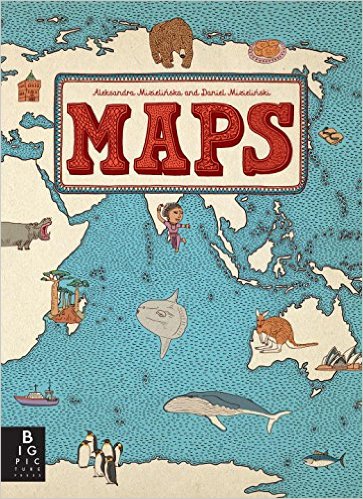
Her first choice is Maps, an “artful, rich atlas of the world” hand-drawn by Aleksandra and Daniel Mizielinska, a Polish couple who are best-known for their popular typefaces. McDanold can’t stop gushing over Maps, calling the book “clever and creative,” and a gorgeous gift idea for “anyone who loves maps.” As she flips through, McDanold calls Maps “just plain beautiful,” stopping on the page for Croatia and admiring the illustrations of all the qualities that make Croatia unique: folk costumes, animals, foods, the flag. The book, she says, gives readers “a sense of the culture and the country.” There are similar portraits of other countries, including Tanzania and Namibia and “a fair amount of Europe,” though McDanold notes that the book doesn’t include every country in the world, calling it “an auxiliary reference” that kids and adults will spend hours poring over, admiring the sheer artfulness of it.
The other book that McDanold has been excited about most recently is Chasing Secrets: A Deadly Surprise in the City of Lies, by Gennifer Choldenko, an author who won a Newbery Award a few years ago for her novel Al Capone Does My Shirts. Set in San Francisco in the Gilded Age, Chasing Secrets tells the story of what happened when an outbreak of the plague, possibly introduced to the city by travelers from Hawaii, caused panic in the city. “The civic approach,” McDanold says, “was to wall off Chinatown. In Hawaii, the civic leaders actually burned down Chinatown” in response to the outbreak. (This was just before the discovery of germs, when nobody could conceive of microscopic life causing illness.)
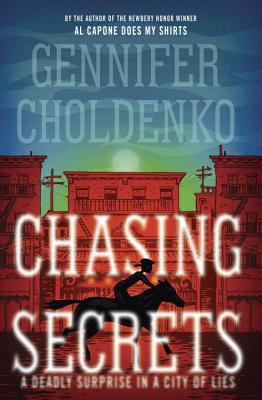
The main character of Chasing Secrets is Lizzy, a girl of twelve or thirteen who “lives with her widowed father, a doctor and a very caring, compassionate fellow who does the best he can without scientific knowledge.” Lizzy finds out about the proposed quarantine of Chinatown, and she becomes worried about what this means for the son of the family’s cook, an immigrant from China with a son Lizzy’s age.
McDanold says Chasing Secrets is appropriate for anyone aged ten and up. It raises questions about “what grownups are hiding from kids and how inequitable the world is for people who are different” from the status quo. Choldenko is a gifted researcher, and the book is packed with detail, both in the narrative and in an informative author’s note at the end, that provides context and information to modern readers. As a historical novel, she says, it’s “top-notch.” “I really liked this book,” she enthuses, calling it “a pretty good echo of our time,” focused as it is on the qualities of “real leadership when it comes to people who are different.” Maybe someone should send Donald Trump a copy.
We've done our best to avoid Star Wars mania here on the Seattle Review of Books, but even we can't ignore this J.G. Ballard review of the original movie from 1977. He calls the film "totally unoriginal, feebly plotted, instantly forgettable, and an acoustic nightmare." At least one of those descriptions has been proven wrong by the march of time. But the rest of Ballard's argument, that science fiction is a serious literary trend and that Star Wars is not a fair representation of good science fiction, is an interesting one. Even if you don't agree with his thesis, you'll want to read this piece. Is Ballard fake-geek-girling Star Wars? Is he right? The happy answer is he's right, and he's wrong, and you're right, and you're wrong. It's possible for a universe to contain as many different opinions as there are people who have opinions. Sometimes it's interesting to read a contrarian take just to gather a new opinion about a time-honored piece of art.
(Via Aaron Stewart-Ahn on Twitter.)
It's time to stop giving cash awards to David Shields
Congratulations to Seattle poet Storme Webber for winning a Frye Art Museum | Artist Trust Consortium 2015 James W. Ray Award. That $15,000 prize will undoubtedly go toward the creation of some exciting new writing that Webber will share in one of her many readings around town. That’s exactly what an award like this is for; it provides income to pillars of the community who work in fields (like, say, poetry) that don’t pay very well.
It should be noted that I was a nominator for this year’s James W. Ray Award. Absolutely none of the people I nominated won. (Though I think Storme Webber is a great choice!) No hard feelings there; that's the way this nomination game works.
UW professor David Shields was the big winner of the James W. Ray Award this year. He won $50,000, which the awards press release indicates is “intended to free artists to advance their creative work.”
I’d just like to take this opportunity to send a plea to Artist Trust and the Frye Art Museum and anyone who may be reading this who is in an organization that offers awards to writers: Stop giving David Shields money. Please.
Look: David Shields is doing just fine. In one of his most recent books, I Think You Are Totally Wrong: A Quarrel — the man publishes so many books it’s hard to tell exactly where Wrong falls chronologically on the Shields spectrum of published work — he brags about making $200,000 a year as the Milliman Distinguished Writer-in-Residence at the UW, and through his other royalties and speaking engagements.
How much freer does David Shields need to be? $50,000 could entirely fund a pair of young, poor writers for a year. It could have meant an entire year of focus for a Seattle-area writer, a once-in-a-lifetime opportunity to quit a terrible job and make a living as a writer, as a member of the literary community. What’s David Shields going to use it on? More David Shields bullshit, probably.
Do I believe that money should be the only criteria for giving a writer work? Absolutely not. And this is not just a matter of money. It's also about bandwidth. If a writer puts out five books in the span of a year and a half, as Shields has just done, they probably do not need an award specifically to “free” them and “advance their creative work.” David Shields’s creative work is “advanced” enough already. He is plenty “free.” He has all the resources of the UW at his disposal. He’s got famous friends. He was in the zeitgeist with both the terrible J.D. Salinger biography that he cowrote and the awful J.D. Salinger biography that featured him as a talking head. (Shields seemed to think the fact that Salinger had one testicle was the key to understanding Salinger’s work. His writing on the subject was exactly as stupid as it sounds.) He was in a documentary made by James fucking Franco about Wrong. He is the exact opposite of a struggling artist. Should we penalize him for his success? Absolutely not. But we should not worry about "freeing" him, either, or "advancing" his work. He's doing just fine, thanks.
Maybe you like David Shields. This is fine. I, personally, have not loved one of his books since Black Planet. I think most of his work is prone to pretentious twaddle and weak academic attempts at bomb-throwing. You may like it, and that’s okay. But I hope you can agree with me that David Shields, with his two documentaries and five books produced in the last couple years, takes up enough space already. He does not need to hoover up any more of the tragically limited resources available to writers in this town. You can like his work, you can advocate for his work, you can encourage his work.
But for Christ’s sake, stop funding him. Give the money to someone who actually needs it. Please. I could recommend a couple dozen Seattle writers off the top of my head who would make better use of the money. Give me 24 hours and I believe I could come up with — and I am not exaggerating, here — over 100 more deserving writers. In this time when arts nonprofits are suffering, let's at the bare minimum all agree to save the freedom and advancement for those who really need it.
Grandmother Grant
Not the rejected lies of the New York Foundling
home, not the adoptive widow of two names,
one of devious spelling,
not the dog tag pinned to the plaid dress
for the train ride to Missouri, but the surname
work like a shoulder brand
on the skin of the natural mother,
Grandmother Grant.When I went in my black robes through the hot
streets of the city, a young nun
pale as the star I followed
led to the desk of a three-faced guardian. One
face called me Sister to my face. One was
motherly, "Oh my dear, I can't risk the wrong
information." One, older than the order, nervous,
bit the sentence off
on a fragment of Irish history.I couldn't get past the gate. I recognized
the road I was on
led to heaven or hell. Either was barred,
date too early for the name,
a Closed File. I should tell my mother to come.
Back home in Oregon, sixty-nine, wanting to know,
not wanting to know, she waited.
I crossed the continent angry, three thousand
miles of featureless plain.Mother, now that you're gone, I'm the same,
swaddled no more in the habit.
Whatever it is that drives us — bad blood,
the face in the unlighted window,
I'm bound to get it straight. If he knocked her down
in the stinking hold of a ship and raped her,
if she followed him out of the church
into the oldest garden under moonstone limbs
of the sycamore, it's too late
to cover her tracks.Whoever she was, whatever ties,
here is my claim. I need to come into my own.
The Seattle Public Library is launching a flash fiction contest on the first day of 2016 "in honor of science fiction writer and Seattle resident Octavia Butler." The contest is named "Door to a Pink Universe," it's for fiction "between 500 and 750 words" in length, and the story "must be a work of science fiction set in any one of The Seattle Public Library locations, evocative of the social, racial and historical themes found in Octavia Butler's fiction." You have between January 1st and February 29th to enter. Start thinking about your entry now.
It's a musician's life
Eugene M. Babb spent a life in gigs, and then wrote about it. His book Grit and Roses, published by Third Place Press (yes! Third Place books has a press! They print books on their Espresso Book Machine, Ginger), covers his thirty years of life as a working musician.
We have two expcerpts from this short, sharply told book on our sponsors page. How wonderful to have a local author, published by a local press, as a sponsor this week. We loved the work, and thin, you will too.
And thanks to Babb and Third Place Press, we're able to bring you the content we do every day. Sponsors like them help us in our campaign to make internet advertising 100 percent less terrible. All we ask is that you take a read.
Recommended books for the young reader in your life
Book shopping for teenagers can be daunting, but they make excellent gifts and provide plenty of opportunities to introduce young adults to new authors to love. Here are some recommendations of books both new and old for the 13-and-up crowd that are worth adding to your shopping list.
Daniel José Older’s fierce and fantastic heroine Sierra — Buffy has nothing on this young woman — takes on family history and the forces of darkness in the heritage-embracing Shadowshaper, while Robyn Loxley finds herself forced to take on the power-mad governor of Nott City after her family is attacked and she must run for her life in Shadows of Sherwood by Kekla Magoon. (Robin Hood as a twelve-year-old girl — why did it take so long for this book to be written?)
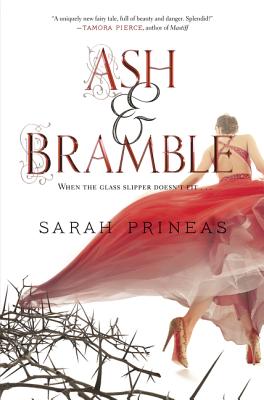
Changeling folklore gets a new spin in Cuckoo Song by Frances Hardinge and Magonia by Maria Dahvana Headley. Hardinge gives readers a protagonist who is the ultimate outsider as she fights to find out who she is in a WWI-era England that hides a dark secret world while Headley’s protagonist is a thoroughly modern girl who appears to be living in a John Green-style sad story until she finds out she is not who she thinks she is either and another secret world is revealed. Both titles are full of surprises and some powerful moments about what the word ‘family’ can mean.
In the past couple of years, mermaid folklore was upended by Bennett Madison’s tale of longing and abandonment in September Girls and the selkie myth was taken on by Margo Lanagan in The Brides of Rolllrock Island (both now out in paperback), both of which were welcomed by readers interested in challenging long held myths. Those same readers will want to take on Nicole Kornher-Stace’s Archivist Wasp, which considers what happens when society loses its history and a ghost and powerful doomed girl —more shades of Buffy — must take the journey of a lifetime to set things right, and Leah Bobet’s An Inheritance of Ashes , which seems to be about the aftermath of a brief and bloody war in a place reminiscent of Civil War-era America but really is about all the ways in which lies casually become the truth on the field of battle and then permeate society afterward. Bobet gives readers some steampunk in this book, as well as sisters who can’t say the right thing, a clash between religion and science, and a joyful hat tip to Ada Lovelace. You think you know what is happening in all of these titles, but trust me, all bets are off until the final pages are turned.
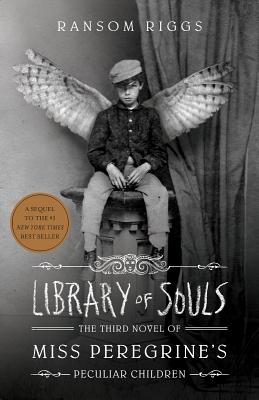
Fans of more realistic fiction will find a lot of love for girl detective/high school student Lois Lane in Gwenda Bond’s Fallout (with a sequel due next year), the witty Scooby Gang crime busters in Varian Johnson’s The Great Greene Heist (sequel due in January), and the mystery-solving of friends Milo and Meddy in Kate Milford’s Greenglass House (which skews to the younger end of the teen spectrum). For more mystery ideas, the Soho Press Teen imprint is worth a look.
You can not ignore the delightfully determined Willowdean, a Dolly Parton-loving daughter of a former beauty queen who decides to strike a blow against society’s idealized versions of beauty by taking a big risk in Julie Murphy’s Dumplin’ and Rainbow Rowell’s fans (who are legion) will be thrilled to know that 2013’s Fangirl sparked the recent release of Carry On which is fan fiction come to life. (That sounds more complicated then it is; just know that if they loved the earlier book, they need its companion.)
Nova Ren Suma continues to beguile with fury and sadness found in the startling pages of The Walls Around Us and Adam Silvera dangles the offer of changing everything about yourself in More Happy Than Not (this one grips your heart so very hard).
Whew!
For nonfiction lovers, the stellar Scientists in the Field series had three new releases in 2015: The Call of the Osprey, The Octopus Scientists, and Inside Biosphere 2. With their outstanding color photographs and welcoming design, this is a series with broad appeal and readers will easily find a subject (from frogs to beetles to volcanos), to immerse themselves in. Pacific Northwest residents should especially take note of The Next Wave and Tracking Trash, both of which have regional angles. (See the full title list here)
There are also several historical titles that shined brightly this year, including Susan Campbell Bartoletti’s in-depth sympathetic look at the “deadliest cook in America” in Terrible Typhoid Mary; Phillip Hoose’s uncovering of a forgotten WWII episode, The Boys Who Challenged Hitler and Steve Sheinkin’s latest: Most Dangerous: Daniel Ellsberg and the Secret History of the Vietnam War. (All of Sheinkin’s earlier works, on subjects ranging from Benedict Arnold to the Port of Chicago tragedy and the Manhattan Project are well worth seeking out also.)
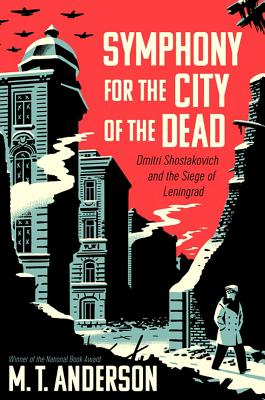
Finally, for the gift that gives all year long, Lizzie Skurnick Books offers a subscription service for its reissues of classics with copyright dates from the 1930s—1980s. Timeless titles from Sydney Taylor, Louise Fitzhugh, Lois Duncan, Norma Klein and many more fill the backlist, all of which can also be bought separately.